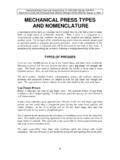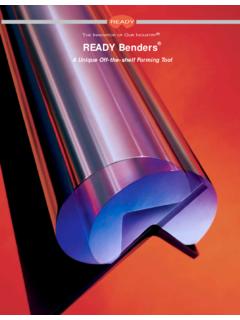Transcription of Recent Advances in the Construction of Solar …
1 Recent Advances in the Construction of Solar Arrays for CubeSats Adam W. Reif, Vinh Hoang & Andrew E. Kalman Pumpkin, Inc. Slide 1. Outline SOA Solar Panels CubeSat Mechanical Constraints Kapton +Adhesives-based Approach Next-generation Expectations array Design Mechanical array Design Solar Panels Results 56W Solar array for CubeSats Conclusion Slide 2. Fixed 3U: 6-, 7- & 8-UTJ-cell panels SOA Panels Deployable 3U: 6-UTJ-cell panels Slide 3. SOA Panels Pumpkin's MISC 2 has 3U-size fixed and deployable Solar panels Each panel has six 40x70mm UTJ Solar cells, utilizing conventional Solar cell attachment techniques Slide 4. CubeSat Mechanical Constraints Typical ( ) PCBs leave precious little room for Solar cells on three available faces given P-POD's available height outside 100x100mm CubeSat cross-section Slide 5. Kapton +Adhesive-based Approach Aerospace Corp's approach with NuSil . Overview One-sided Kapton adhesive to insulate from base material (Al).
2 Two-sided NuSil adhesive to attach Solar cell Adhesive thicknesses and cutouts chosen for maximal flatness of cell Conductive epoxy to connect cells Post-assembly thermographic analysis to ensure no air bubbles, etc. Benefits Highly configurable Rapid, non-messy assembly Cure time required only for epoxy (short). Drawbacks NuSil is expensive Rework options are limited Does not address Solar cell string and array wiring issues Slide 6. Next-generation Expectations Need (much) more power than Colony I's 15W OA. Restricted mass allocation for panels / arrays Redundancy in array wiring Need arrays NOW. UTJ or better cells Thermal issues Cost-sensitive Need more power Need more power Need more power Need more power Need more power Need more power Need more power Need more power Slide 7. array Design - Mechanical Conventional technologies found to be best fit Small-scale moving parts Finishes and coatings are critical PCBs are foundation of panels, in large part due to the simplicity of wiring through a PCB-based approach, and because of copper's excellent thermal conductivity System-based approach assemble each array from Pumpkin catalog of components, with standard, semi- custom or custom PCBs Except for screws and pins, every mechanical component (hinge, spring, etc.)
3 Is a Pumpkin design Presents an interesting mechanical puzzle Slide 8. array Design - Mechanical center panel Hinged to CubeSat via CubeSat Hinge . Deploys at user-specified angle (45 to 190 ). Routes power from all panels into EPS via harness(es). For typical CubeSat applications, connects to winglet panels on either side via 90 hinge + torsion spring Stowed Deployed Deployed Slide 9. array Design - Mechanical Winglet panel(s). Three types left, right, and ambidextrous When stowed, winglets are stacked on top of each other (long-edge binding) when deployed, they open into a single plane (fanfold). Each winglet panel connects to its neighbor(s) via multiple 180 . hinges + torsion springs Same panel and hinges for underfolder or overfolder configuration Stowed Deployed underfolder Deployed - overfolder Slide 10. array Design Solar Panels Modified version of Aerospace Corp technique used to apply cells to panels uses NuSil and conductive epoxy Additional use of Kapton tapes for UV shielding, dark side radiator, etc.
4 PCB material is Copper-clad FR4-type in applicable thickness (<< ). Copper layout carefully controlled for maximum thermal transfer ( sea of vias ), minimum warping through temperature extremes, hard points for hinges and spacers, etc. Cell packing: Eight cells per panel $$$. Seven or six cells per panel much more economical Slide 11. array Design Solar Panels Eight series-connected 40x70mm UTJ cells per panel Blocking diodes on each panel permit wire-OR'd power distribution within 8 SNP arrays Panels are electrically interconnected via hinge springs (no cabling required). Redundancies: Four blocking diodes per array (2 hot, 2 cold). Two springs per string terminal (2 + , 2 - ). Redundant array output terminals (2 + , 2 - ). Additional redundancies in the copper layers Hinge spring also Optional redundant inter-panel wiring pads carries current Additional contact redundancies in the winglet hinges across panels Conservative design safety factors Slide 12.
5 Results 56W array designed, developed and delivered in under 90. days represents three generational design iterations 56W array delivers expected power in terrestrial (sol) tests Panels tested and passed at Pumpkin: 40 C to +140 C. array tested to mission profile and accepted by customer Thermographic testing reveals no trapped voids, etc. Panel production, test & validation time: 1 cell/technician-hr Slide 13. 56W Solar array for CubeSats 56W EOL power from 8S7P Solar array configuration Three winglets per side, and side panels fit, too. All seven panels aligned to same normal, within 5 (2 typical). 56W Solar array , deployed 56W Solar array , stowed around CubeSat Slide 14. Conclusion Pumpkin's collection of Solar array hardware permits a wide range of hinged Solar array configurations beyond those illustrated here ( , puddle-jumper 3U nadir-pointing configuration). Pumpkin can deliver Solar panels and Solar arrays using these assembly techniques on short order not only for CubeSats 8-UTJ-cell panel for 3U-size CubeSats Special thanks to the Aerospace Corp.
6 , esp. Petras Karuza, David Hinkley and Siegfried Janson Slide 15. Q&A Session Thank you for attending this Pumpkin presentation at the 2010 CubeSat Summer Developers Workshop! Slide 16. Notice This presentation is available online in Microsoft . PowerPoint and Adobe Acrobat formats at: . and: Slide 17. Appendix Speaker information Dr. Kalman is Pumpkin's president and chief technology architect. He entered the embedded programming world in the mid-1980's. After co-founding Euphonix, Inc the pioneering Silicon Valley high-tech pro-audio company he founded Pumpkin, Inc. to explore the feasibility of applying high-level programming paradigms to severely memory-constrained embedded architectures. He is the creator of the Salvo RTOS and the CubeSat Kit. He holds several United States patents. He is a consulting professor in the Department of Aeronautics &. Astronautics at Stanford University and directs the department's Space Systems Development Laboratory (SSDL).
7 Contact Dr. Kalman at Acknowledgements Pumpkin's Salvo, CubeSat Kit and MISC customers, whose real-world experience with our products helps us continually improve and innovate. CubeSat Kit information More information on Pumpkin's CubeSat Kit can be found at Patented and Patents pending. Copyright notice 2000-2010 Pumpkin, Inc. All rights reserved. Pumpkin and the Pumpkin logo, Salvo and the Salvo logo, The RTOS that runs in tiny places, CubeSat Kit, CubeSat Kit Bus, CubeLab Kit, the CubeSat Kit logo, and MISC. are all trademarks of Pumpkin, Inc. Don't leave Earth without it is a service mark of Pumpkin, Inc. All other trademarks and logos are the property of their respective owners. No endorsements of or by third parties listed are implied. All specifications subject to change without notice. Unless stated otherwise, all photographs, images and illustrations are the property of Pumpkin, Inc. and may not be used without permission. First presented at the CubeSat Developers' Workshop in Logan, Utah on Sunday, August 8, 2010, prior to the 4th Annual AIAA/USU Conference on Small Satellites.
8 Slide 18.








